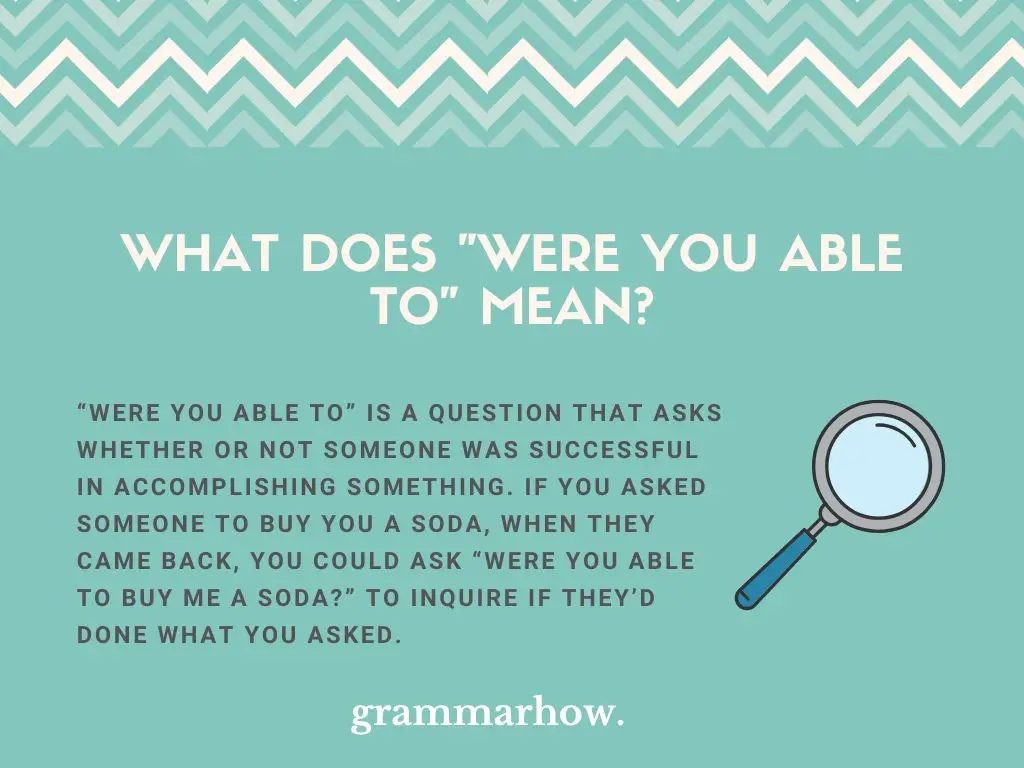The phrase “were you able to” is used very often in English. But what does it actually mean? How do you use it properly in a sentence?
In this post, we will cover the answer to both of these questions in detail.
What Does “Were You Able To” Mean?
“Were you able to” is a question that asks whether or not someone was successful in accomplishing something. If you asked someone to buy you a soda, when they came back, you could ask “were you able to buy me a soda?” to inquire if they’d done what you asked.

Basically, it’s just another way of asking “hey, did you do that thing?” It doesn’t necessarily have to be a request. Someone could tell you that they were going to write a song, and the next day, you could say “were you able to write that song?” to ask if they had actually accomplished their goal.
This is specifically in past tense, but you can also say “are you able to” for present tense. In present tense, “are you able to” does not ask someone if they accomplished something, but rather if they are capable of accomplishing something at all.
So, you can use “were you able to” to ask “did you do the thing” and “are you able to” to ask “are you capable of doing this thing?”. It’s just a synonym phrase for those phrases.
How to Use “Were You Able To” in a Sentence
Just to make sure there is no room for confusion, we have provided a number of examples of how to use “were you able to” in a sentence down below:
- Were you able to attend the meeting yesterday, John?
- Hey, Sam, were you able to connect now that you restarted your router?
- Were you able to work even though your computer wasn’t working?
- Hey, John, were you able to get the correct answer on the test?
- Lisa, were you able to receive my email?
Could You vs. Were You Able To
On the surface, “could you” and “were you able to” may seem synonymous. But that isn’t actually the case. “Could” asks whether or not someone was able to do something. “Were you able to” asks whether or not they actually did. That distinction might seem minor, but it’s bigger than you think.
Consider the following sentences:
- Could you attend the meeting yesterday?
- Were you able to attend the meeting yesterday?
In the first sentence, you ask someone whether or not it was possible for them to attend the meeting. However, you are not asking for an affirmative, you are only asking whether or not it was possible.
But in the second sentence, you are actually asking for confirmation on whether or not the person attended the meaning. It’s like the old days of school, where you would ask a teacher “can I go to the bathroom?” and they ask “I don’t know, can you?”.
There’s a slight difference between asking is someone is capable of doing something and whether or not they actually did it. That’s the difference between “could you” and “were you able to”.
Were You Able To – Synonyms
If you don’t want to say “were you able to”, there are some other ways to say it. Below are a few examples of some other ways you can say “were you able to”.
- Did you manage to
- Did you accomplish
- Did you do
- Did you perform
- Did you see to
All of these synonyms ask the same thing as “were you able to”. They ask someone if they successfully accomplished something. Thus, any of them work as a replacement.

Martin holds a Master’s degree in Finance and International Business. He has six years of experience in professional communication with clients, executives, and colleagues. Furthermore, he has teaching experience from Aarhus University. Martin has been featured as an expert in communication and teaching on Forbes and Shopify. Read more about Martin here.
